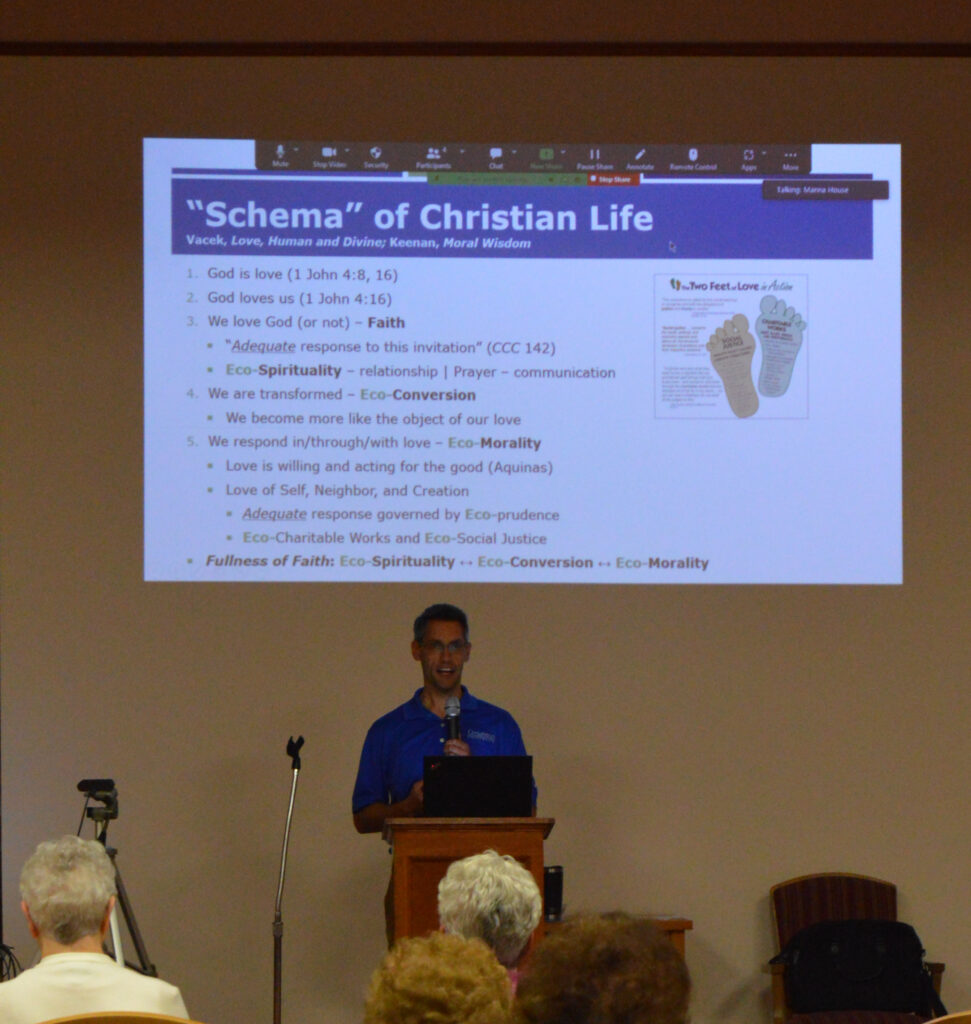
Sisters and guests met recently at the Nazareth Motherhouse for the 2023 Theological Institute presented by Daniel R. DiLeo, PhD. Dr. DiLeo is a Catholic theological ethicist, associate professor, and director of the Justice and Peace Studies Program at Creighton University in Omaha, Nebraska. The conference spanned four days and was packed full of important information. Titled Start a Revolution: Climate Change, Ecological Conversion, Systemic Catholic Action, the Institute aimed at deepening our roots in the Christian tradition and exploring its implications for living the Gospel in the contemporary world. More specifically, it focused on the ecological crisis that our planet is in and our responsibilities and duty to respond.
Dr. DiLeo’s research focuses on Catholic social teaching, climate change, and Laudato Si’. In May 2015, Pope Francis released a public letter titled “Laudato Si’: Care for Our Common Home” that focuses on care for our planet and all people. Climate change is a moral issue that implicates the Church’s mission and core commitments of Catholic social teaching. Pope Francis has urged people and communities to “start a revolution” to prevent accelerating the climate catastrophe.
One of the sessions of the Institute was Climate Change and Catholic Social Teaching which opened with the idea that human dignity can be realized and protected only in community. There are basic rights that everyone needs to live and thrive. Dr. DiLeo explained that our rights and responsibilities always go together in Catholic teaching.
The group in attendance was ready to learn and was faced with some pretty hard truths as far as the future of “Our Common Home” goes. Dr. DiLeo stated that climate science can be uncomfortable and downright painful and necessitates concrete action. Some of the facts presented by science are that 4% of the U.S. population is responsible for 22% of the entire world’s emissions. Another is that if we keep the policies that are currently in place, the global temperature will rise by 1.5ºC by the end of the century resulting in a catastrophic loss of human life, not to mention all living species on the planet. In other words, what we already know requires a response. The Sisters and guests were given time to reflect on and discuss what they were learning and to share their feelings. Sister Mary Savoie shared, “It seems like a humongous problem and it affects every person on Earth. What can I do so I feel like I’m helping?” she wondered, “What can we do together to make some difference?” Sister Marilyn Wall expressed, “ There is no endpoint. It’s a matter of always weighing the things that are needed and what we can do.”
DiLeo said that while the science did indeed bring up some painful realities, all is not doomed. As the Pope’s encyclical states, “All is not lost. Human beings, while capable of the worst, are also capable of rising above themselves, choosing again what is good, and making a new start, despite their mental and social conditioning.” (1)
We have to realize that we all are dependent upon each other for the good of humanity. We have an urgent need to develop policies to reduce polluting gasses and utilize renewable energy. Pope Francis says that “we have a responsibility before God to protect the earth, under constant attack from devastating effects of climate change” which requires a concrete response by all. In the Paris Agreement, a concept of net zero greenhouse gas emissions by mid-century was agreed upon by nearly 200 countries. The Paris Agreement is a legally binding international treaty on climate change. It was adopted by 196 Parties at the UN Climate Change Conference (COP21) in Paris, France, on 12 December 2015. It entered into force on 4 November 2016. (2)
The goal of net zero emissions by 2050 was set to keep global warming to 1.5ºC or lower. “We are not going to bike our way out of this crisis. We are not going to turn off enough lights to get out of this crisis,” DiLeo explained. “We need to develop policies to get everyone on the same page.” Time is ticking by. Each year that passes with no policy changes to improve the preservation of “Our Common Home,” the closer we come to a tipping point to which the warming of the planet increases and is largely irreversible.
DiLeo emphasized that the Church’s mission is to advance God’s Kingdom. We must be preaching what we are living, and living what we are preaching. We cannot allow politics to override our religious beliefs and influence our belief in the science of climate change. While the subject of climate change is uncomfortable and unpopular, changes can be made when we work together. If we start now. One of the themes of Catholic Social Teaching is Solidarity – We are ALL responsible for ALL.
Education is key in making progress for any subject. Dr. DiLeo hopes to engage not only Catholic leaders, but all of us in the pursuit of net zero commitments and the preservation of “Our Common Home.” He quoted Max Lucado, reminding us that, “Nobody can do everything, but everybody can do something.”
1- (LS 205)
2-Credit: UNFCCC, https://unfccc.int/process-and-meetings/the-paris-agreement